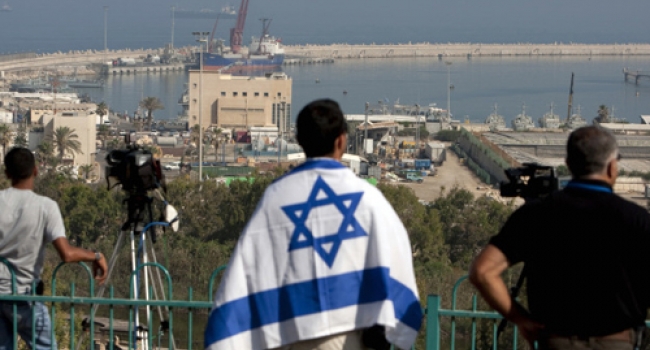Israel endangers its own security after flotilla attack

At present moment the details remain unknown, but it is certain that the consequences of the attack launched against international Gaza aid flotilla will negatively affect Israel’s image in the world.
It ended in blood on the ‘Freedom Flotilla’, a group of ships belonging to European NGOs en route to Gaza with the intention to break the Israeli naval block and deliver humanitarian aid to the Palestinian population. The last reports says 10 activists killed and 26 injured, six of them Israeli soldiers.
From the beginning it was easy to realize how delicate the issue of the flotilla would be for the government of Tel Aviv, but the tragedy triggered by the use of violence could be the final shove to the traditional diplomatic alliance between Israel and Turkey, already fluctuating over the past two years.
NATO member and now a powerful protagonist in the Middle East, Turkey has participated actively in the organization and sponsorship of the Freedom Flotilla: many activists on board of the ships were Turkish, many organizations were Turkish and the Turkish flag hung on the side of the ferry “Mavi Marmara”.
The attack would take place between 4:30 and 5 am (local time) about 75 nautical miles far away from the Israeli coast, in international waters. According to the Israeli Army Press Office, “on five of the six ships of the flotilla, the soldiers met without any resistance from the passengers and the ships were brought to the Ashdod port” without troubles, but “during the boarding of the Turkish ship – the Mavi Marmara, the largest of the flotilla’s ships – the Israeli Navy soldiers were attacked with gunfire, stun grenades, knives and dubs. The demonstrators – continued the press release – stole two pistols from the soldiers and used to shoot at the soldiers, obligating the soldiers to operate their weapons in light of the danger to their lives”.
Organizers of the “Freedom Flotilla” deny the charges, stating that the ship was free of weapons; before the departure each participant has been checked with metal detectors. To confirm its version, the Israeli Army has recently published a few videos from the assault; you can see the violent reaction of activists during the boarding of the Israeli soldiers.
During the press conference on May 27th, the commander of the Israeli Navy, Vice Admiral Eliezer Marom, said that as IDF soldiers they “will act professionally, operating according to the spirit and the values of the IDF because we have a very clear mission to carry out: we will prevent them [the flotilla] from entering the Gaza Strip”.
Of course the IDF fully accomplished its mission – the flotilla ships are now moored in the Ashdod and Haifa ports – but how much will this mission cost Israel?
Nobody knows yet, but for now only two things are clear: not all the activists came in peace; the Israeli Navy soldiers were not trained enough to deal with a group of people with knives and clubs.
From the “No Global/Black Block” groups to the Ultras groups during the soccer matches, the different European polices are facing similar situations almost everyday: in most cases shooting is not the normal behavior to stop and capture someone who is using metal rods, but if it happens the police chief and the minister of defense will lose their seats.
In Israel, as reported from Haaretz - the most prestigious Israeli daily English newspaper – the Prime Minister, Mr. Benjamin Netanyahu, reacted “regretting the loss of life sustained by international activists” but specifying that “the Israeli troops who opened fire were justified for defending themselves".
EU, UN and Turkey asked Israel for an investigation that – even in the most positive case for Israel – will never heal the enormous psychological shock suffered by the world and the diplomatic tear with Turkey. In a few words: Israel damaged its already negative image in the world and with many probabilities the traditional alliance with the only Islamic friend, Turkey.
The IDF mistake was not only to send unprofessional soldiers into the field, but also to attack a Turkish ship in International waters – and not in the Israeli or Gaza naval territories. Due to the International Maritime Law, what happened to the Mavi Marmara can’t really be considered a pirate act (the doctrine is not defined yet); for the Turkish government it is as a strong slap.
An “act of State terrorism”, as the Prime Minister Recep Tayyip Erdogan said today, after recalling the Turkish ambassador in Israel, and suspending the traditional joint military exercises with the Israeli Army and asking for a special session of the UN Security Council.
For two years now, Ankara has made slow and progressive steps toward Middle Eastern alternative positions, going far away from the traditional Israeli partner and meeting Syria, Iran and the Palestinians.
The causes of this strategic movement are essentially three fallouts: the Turkish target became a recognized regional power and so the necessity to get as more partners as possible in the Caucasus and in the Middle East (where many countries don’t recognize Israel as a legitimate country); the scaling of power in the governmental establishment of the Turkish military class (with whom Israel had always excellent relations); the last Israeli military operations in Gaza (considered “disproportionate” by the Turkish government) and the gaffes of the new Israeli government (see the episode occurred last January, when the Israeli deputy foreign minister, Dany Ayalon, ridiculed the Turkish ambassador Cellikol during the break in a television program).
The event on the Mavi Marmara is really a heavy blow for Ankara, particularly because of the repeated requests to the Israeli government to formulate a rational and acceptable way to disembark the humanitarian aid from the fleet.
Yes, Turkey is moving far away from Israel but it seems that the Israeli government is wishing to lose the partnerships as soon as possible, as a punishment to Ankara for its new geopolitical strategy and the relations with Iran.
It is true, Israel has many enemies. Many of them are Arabs countries that want the destruction of Israel, others are supporters of the anti-Zionist cause, but in these days it seems evident that the most dangerous enemy of Israel is its own government, always ready to display an excessive use of force that endangers the security of Israel and undermines its image in the world.
Article published on Digital Journal on the 1st of June 2010.

















